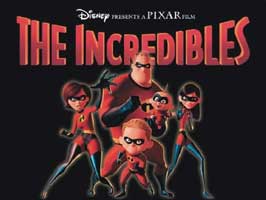|
Archive: November 21, 2004
|
 I saw The Incredibles with Megan this afternoon. I thought it was - excellent. I can't wait to see it again, and to have the DVD. I'll say what everyone else always says about Pixar movies, it isn't the animation or the technology, it's the story. And this was a wonderful story. I mean, how great was it that the "supers" were retired by liability lawsuits? And I loved the line "when everyone is super, nobody is", and the graduation from 4th grade to 5th grade. A politically incorrect but terrific statement, embedded in an action movie disguised as a kid's cartoon. The whole thing just worked. I saw The Incredibles with Megan this afternoon. I thought it was - excellent. I can't wait to see it again, and to have the DVD. I'll say what everyone else always says about Pixar movies, it isn't the animation or the technology, it's the story. And this was a wonderful story. I mean, how great was it that the "supers" were retired by liability lawsuits? And I loved the line "when everyone is super, nobody is", and the graduation from 4th grade to 5th grade. A politically incorrect but terrific statement, embedded in an action movie disguised as a kid's cartoon. The whole thing just worked.
One suggestion for the Pixar team, not that they need it; in the sequel, it would be great if there was a "super" who wasn't genetically super. Sure, some are born with "special powers", but you can be super through hard work and determination, too.
I can't wait for Incredibles, Too.
|
|
It's Sunday afternoon, I'm sitting in front of the fire, watching football, so it's time for a rant. Let me just say, that in 2004 plaintext email is obsolete.
First and foremost, if you cannot see HTML-formatted email, then you're using the wrong email client. Don't send me email (plaintext or otherwise) extolling the virtues of pine or eudora 1.0 or your favorite program from 1993. If your client cannot display formatted email, then you're totally behind the curve. This is a platform-independent observation, it doesn't matter whether you use Windows or Mac or Linux or whatever - I promise there is a client that can render HTML email. Heck, my Treo phone can render formatted email. You don't watch black-and-white TV, do you?
Next, if you don't send HTML-formatted email, then you're behind the curve. You don't have to use eight different fonts and colors and lines and boxes (although it might help you communicate). You don't have to include diagrams and pictures (although it might make your email more interesting). But you need the basics; paragraphs, italics, underlines, proportionally spaced fonts with serifs. How lame is it when you get a plaintext email and the lines wrap in funny places for no reason? You don't type memos on a typewriter, do you?
The most common objection to formatted email is that it isn't compatible. That was perfectly valid in 1997. However in 2004 that argument is ridiculous. It is like optimizing video for viewers with black-and-white TVs. (Yeah, I know, home teams still wear white. That's dumb, too.)
Then there is the objection that plaintext email is cooler. Well maybe to you. To me, handwriting is cooler than printing, stereo is cooler than mono, color is cooler than black-and-white, 3D is cooler than 2D. And formatted email is cooler than plaintext.
Some will tell you plaintext email is faster. That was true with 9600 baud dial-up. With broadband, it is a specious argument. (You do have broadband, don't you? You don't! Okay, then it doesn't matter for 56K dial-up, either.)
Even free online email services like Hotmail and Yahoo let you send and receive HTML-formatted email (sometimes they call it "rich text"). Heck, even AOL lets you format email. It might not be the default - you might have to change your options to turn it on - but you should. If you're sending plaintext email you're sending the wrong message.
Okay, back to football.
|
|

|
|
One of the really great things about blogging is picking through your referer logs. Because you serendipidously discover all kinds of great stuff "out there". The blogosphere is already way too big to grasp, and coming across links to links to links is a great guide.
Anyway, today I found Paul Graham's site; it is not a blog, more an old style home page with a collection of essays. Among them was Great Hackers, which is quite thought-provoking. Among the interesting ideas is the notion that when starting a project, or a business, the choice of language limits the quality of programmers. Paul doesn't think too much of Java:
When you decide what infrastructure to use for a project, you're not just making a technical decision. You're also making a social decision, and this may be the more important of the two. For example, if your company wants to write some software, it might seem a prudent choice to write it in Java. But when you choose a language, you're also choosing a community. The programmers you'll be able to hire to work on a Java project won't be as smart as the ones you could get to work on a project written in Python. And the quality of your hackers probably matters more than the language you choose. Though, frankly, the fact that good hackers prefer Python to Java should tell you something about the relative merits of those languages.
Paul is also biased against Windows:
A couple years ago a venture capitalist friend told me about a new startup he was involved with. It sounded promising. But the next time I talked to him, he said they'd decided to build their software on Windows NT, and had just hired a very experienced NT developer to be their chief technical officer. When I heard this, I thought, these guys are doomed. One, the CTO couldn't be a first rate hacker, because to become an eminent NT developer he would have had to use NT voluntarily, multiple times, and I couldn't imagine a great hacker doing that; and two, even if he was good, he'd have a hard time hiring anyone good to work for him if the project had to be built on NT.
I'm not sure I share his biases against Java or Windows. (Although I must say for myself, if I have to build something, I wouldn't choose either one.) Anyway I fully agree that in choosing a platform, you are choosing a culture.
This is particularly relevant to me because I'm embarking on a new project. I have the opportunity to begin from scratch, with any language. I need to build programs which are clients and servers, and I need to build an interactive website. I want at least some of the stuff to be cross-platform. So what do I use? ASP? C#? Java? I don't think so. Perl? PHP? Maybe. C++? Python? Very likely.
This isn't just about me. I'm going to be working with others... And like Paul points out, this is not just a choice of programming technique, it's a choice of culture. Language talks.
|
Return to the archive.
|


|




